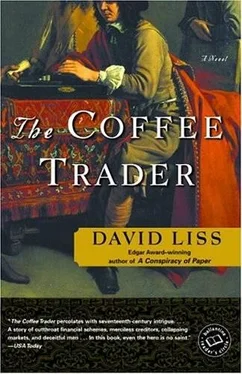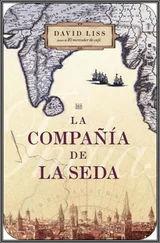The thought weighed him down, a dourness that no triumph on the Exchange could extinguish. But in a few weeks’ time, when Hannah was free of Daniel, he took her for his wife and vowed he would be dour no more. In the comfort of married life, he found it easy to forget Joachim and Geertruid by turns and to once more take pleasure in his business. He put a hand to his temple. Alferonda had surely been right about one thing: it would be madness for him to let coffee go. Already, buoyed by the fame of Miguel’s duel against Parido on the Exchange, the drink’s fame had begun to spread. Already he saw jittery merchants, animated by the wondrous fruit, shouting out their business maniacally. At taverns all over the city, traders had begun to demand the brew in place of beer or wine. Miguel might make his fortune yet.
Though Hannah found, after the baby was born, she had no time to learn to read as she had planned, she did not complain, not even in her heart. Miguel knew she had wanted a girl, but she loved the boy, Samuel, all the same. They discussed the problem of hiding from Daniel that the boy was his, but there was no way to undo what had been done. And Miguel loved the boy as though he were his own. But later, when they had their second son, whom they named for his true father, Miguel found himself favoring this child. At times it sat ill with him that he repeated the arbitrary preferences with which he found such fault in his own father, but what could he do? Some things, he had come to conclude, were merely in a person’s nature.
If business and commerce in the Dutch golden age conjure up any image for most people today, it is that of the trade in paintings, which were regarded mostly as aesthetically pleasing commodities rather than objects of art, or of the tulipomania, the crazed tulip market of the 1630s, which was so recently mirrored in our own dotcom bubble. I was drawn to business in the period, however, because of its sheer innovation. If it would be overstating the case to say that business as we know it came into being in the Netherlands in the seventeenth century, it would be fair to propose that modern business saw its origins in that time and place. The Dutch developed new methods of trade-the joint stock company, commodities markets, futures, stocks, and other forms of speculative trading-mostly because they had to. Coming out of a bitter and protracted war of independence against Spain, the Dutch of the seventeenth century found themselves with very little of any particular value other than their business sense, and with this commercial drive they transformed their nation into one of the most powerful in Europe.
I was also drawn to the period because of the unusual tolerance of the Dutch people. Having vanquished the Catholic Spanish, they offered Catholics an unusual amount of freedom in comparison with other Protestant countries. Jews also found that many cities in the United Provinces offered freedoms unimaginable in the rest of Europe. The Spanish and Portuguese Jews who settled in Amsterdam found their international connections prized by local businessmen.
I began this novel with the idea that I would write about an attempt to control a commodity just as it was emerging. I briefly flirted with the idea of making the novel about chocolate, in part because the seventeenth-century documents about chocolate are much more colorful than those concerning coffee, but coffee and business go so naturally that the switch was inevitable. As I suggest in the novel, coffee was only just catching on in Europe in the middle years of the seventeenth century. By the end of the century, it would be well established as a vital part of public culture in nearly every major capital on the Continent.
My efforts to re-create the world of the Dutch, the Dutch Jews, and the coffee trade involved a great deal of research. In the interest of full disclosure, I have provided a list of my reading.
Allen, Stewart Lee. The Devil’s Cup: Coffee, the Driving Force in History. New York: Soho Press, 1999.
Barbour, Violet. Capitalism in Amsterdam in the 17th Century. Ann Arbor: University of Michigan Press, 1950.
Bloom, Herbert I. The Economic Activities of the Jews of Amsterdam in the Seventeenth and Eighteenth Centuries. Williamsport, Penn.: Bayard Press, 1937.
Bodian, Miriam. Hebrews of the Portuguese Nation: Conversos and Community in Early Modern Amsterdam. Bloomington: Indiana University Press, 1997.
Boxer, C. R. The Dutch Seaborn Empire, 1600-1800. New York: Alfred A. Knopf, 1965.
Braudel, Ferdinand. Civilization and Capitalism, 15th-18th Century. 3 vols. Trans. Sian Reynolds. Berkeley: University of California Press, 1981-84.
Chancellor, Edward. Devil Take the Hindmost: A History of Financial Speculation. New York: Farrar, Straus and Giroux, 1999.
de Vries, Jan, and Ad van der Woude. The First Modern Economy: Success, Failure, and Perseverance for the Dutch Economy, 1500-1815. Cambridge, England: Cambridge University Press, 1997.
Gitlitz, David M. Secrecy and Deceit: The Religion of the Crypto-Jews. Philadelphia: Jewish Publication Society, 1996.
Gluckel of Hameln. The Memoirs of Gluckel of Hameln. Trans. Marvin Lowenthal. New York: Schocken Books, 1977.
Gullan-Whur, Margaret. Within Reason: A Life of Spinoza. New York: St. Martin ’s Press, 1998.
Israel, Jonathan I. “An Amsterdam Jewish Merchant of the Golden Age: Jeronimo Nunes Da Costa (1620-1697), Agent of Portugal in the Dutch Republic.” Studia Rosenthaliana 18.1 (1984): 21-40.
– -. “The Changing Role of the Dutch Sephardim in International Trade, 1595-1715.” In Dutch Jewish History: Proceedings on the Symposium on the History of the Jews in the Nether-lands, November 28-December 3, 1982, Tel-Aviv, Jerusalem, ed. Jozeph Michman, 31-50. Tel-Aviv: Hebrew University of Jerusalem, 1984.
– -. Dutch Primacy in World Trade, 1585-1740. Oxford, England: Clarendon Press, 1989.
– -. European Jewry in the Age of Mercantilism, 1550-1750. 3d ed. London: Littman Library of Jewish Civilization, 1998.
Jacob, Heinrich Eduard. Coffee: The Epic of a Commodity. Trans. Eden and Cedar Paul. New York: Viking Press, 1935.
Jardine, Lisa. Worldly Goods: A New History of the Renaissance. New York: W. W. Norton, 1996.
Mak, Geert. Amsterdam : A Brief Life of the City. Trans. Philipp Blom. London: Harvill Press, 1999.
Nadler, Steven. Spinoza: A Life. Cambridge, England: Cambridge University Press, 1999.
Netanyahu, B. The Marranos of Spain: From the Late 14th to the Early 16th Century, According to Contemporary Hebrew Sources. 3d ed. Ithaca, N.Y.: Cornell University Press, 1999.
North, Michael. Art and Commerce in the Dutch Golden Age. Trans. Caroline Hill. New Haven: Yale University Press, 1997.
Pendergrast, Mark. Uncommon Grounds: The History of Coffee and How It Transformed Our World. New York: Basic Books, 1999.
Regin, Deric. Traders, Artists, Burghers: A Cultural History of Amsterdam in the 17th Century. Amsterdam: Van Gorcum, 1976.
Roth, Cecil. A Life of Menasseh Ben Israel: Rabbi, Printer, and Diplomat. Philadelphia: Jewish Publication Society, 1934.
Safley, Thomas Max. Matheus Miller’s Memoir: A Merchant’s Life in the Seventeenth Century. New York: St. Martin ’s Press, 2000.
Schama, Simon. The Embarrassment of Riches: An Interpretation of Dutch Culture in the Golden Age. New York: Vintage Books, 1987.
Schivelbusch,Wolfgang. Tastes of Paradise: A Social History of Spices, Stimulants, and Intoxicants. Trans. David Jacobson. New York: Pantheon, 1992.
Читать дальше












